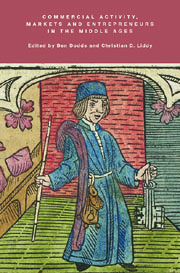 Commercial Activity, Markets and Entrepreneurs in the Middle Ages
Commercial Activity, Markets and Entrepreneurs in the Middle Ages Book contents
- Frontmatter
- Contents
- List of Figures
- List of Tables
- List of Contributors
- List of Abbreviations
- Richard Britnell: An Appreciation
- 1 Unreal Wages: Long-Run Living Standards and the ‘Golden Age’ of the Fifteenth Century
- 2 Minimum Wages and Unemployment Rates in Medieval England: The Case of Old Woodstock, Oxfordshire, 1256–1357
- 3 Crisis Management in London's Food Supply, 1250–1500
- 4 Grain Shortages in Late Medieval Towns
- 5 Market Regulation in Fifteenth-Century England
- 6 Self-Government in the Small Towns of Late Medieval England
- 7 Marketing and Trading Networks in Medieval Durham
- 8 Peasant Opportunities in Rural Durham: Land, Vills and Mills, 1400–1500
- 9 The Shipmaster as Entrepreneur in Medieval England
- 10 Cheating the Boss: Robert Carpenter's Embezzlement Instructions (1261×1268) and Employee Fraud in Medieval England
- 11 The Public Life of the Private Charter in Thirteenth-Century England
- 12 Luxury Goods in Medieval England
- Index of People and Places
- Bibliography of the Writings of Richard Britnell
- Tabula Gratulatoria
4 - Grain Shortages in Late Medieval Towns
Published online by Cambridge University Press: 05 February 2013
- Frontmatter
- Contents
- List of Figures
- List of Tables
- List of Contributors
- List of Abbreviations
- Richard Britnell: An Appreciation
- 1 Unreal Wages: Long-Run Living Standards and the ‘Golden Age’ of the Fifteenth Century
- 2 Minimum Wages and Unemployment Rates in Medieval England: The Case of Old Woodstock, Oxfordshire, 1256–1357
- 3 Crisis Management in London's Food Supply, 1250–1500
- 4 Grain Shortages in Late Medieval Towns
- 5 Market Regulation in Fifteenth-Century England
- 6 Self-Government in the Small Towns of Late Medieval England
- 7 Marketing and Trading Networks in Medieval Durham
- 8 Peasant Opportunities in Rural Durham: Land, Vills and Mills, 1400–1500
- 9 The Shipmaster as Entrepreneur in Medieval England
- 10 Cheating the Boss: Robert Carpenter's Embezzlement Instructions (1261×1268) and Employee Fraud in Medieval England
- 11 The Public Life of the Private Charter in Thirteenth-Century England
- 12 Luxury Goods in Medieval England
- Index of People and Places
- Bibliography of the Writings of Richard Britnell
- Tabula Gratulatoria
Summary
He that withholdeth corn, the people shall curse him: but blessing shall be upon the head of him that selleth it.
This article examines the impact upon English towns of shortages of grain during periods of harvest failure in the later Middle Ages. It explores the reactions of civic and central governments at times of shortage, looking in detail at the census of people, grain, bakers and brewers drawn up in Coventry during the dearth of 1520. This census seems to have formed more than simply a headcount, and it is argued here that its purpose was to ensure that resident traders did not retain surpluses of grain beyond their immediate production needs, and to provide a means by which the city government could demonstrate to its citizens that immoral behaviour was being curtailed. As this census formed one of the key pieces of evidence which Charles Phythian-Adams used to identify a ‘crisis’ period in Coventry between 1518 and 1525, which ‘decisively sounded the knell of the medieval city’, this study also questions whether grain shortages contributed in any way to the significant challenges faced by many towns in this period, which have been collectively labelled as ‘urban decline’. The marketing patterns, regulation and economic development of late medieval towns, and the social and economic policies of urban and central governments, are all areas which have been illuminated by Richard Britnell's wide-ranging and detailed research.
- Type
- Chapter
- Information
- Commercial Activity, Markets and Entrepreneurs in the Middle AgesEssays in Honour of Richard Britnell, pp. 63 - 80Publisher: Boydell & BrewerPrint publication year: 2011


